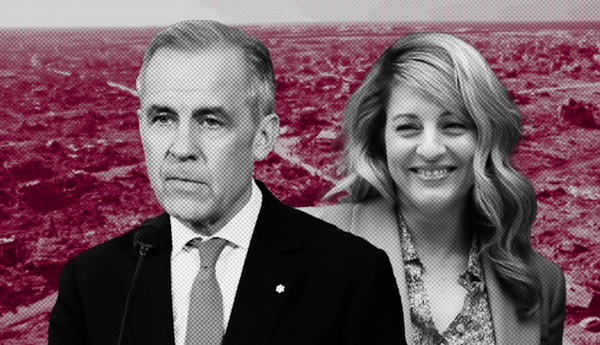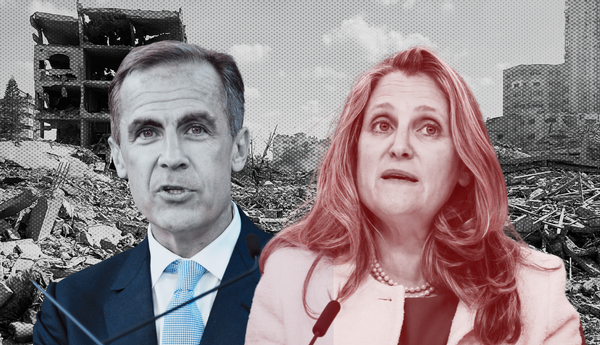Canada’s major oil and gas companies are nowhere close to meeting Paris Agreement targets, according to a new report published by Environmental Defence Canada and Oil Change International.
The report, made public during the United Nations Climate Change Conference in the U.K. on Nov. 3, finds that Canada’s primary oil and gas companies have growth strategies and expansion plans that will worsen the climate crisis. Canadian oil and gas producers are on track to expand production to 30 per cent above 2020 levels by 2030, leading to an anticipated 25 per cent increase in carbon emissions.
The report's findings come after Prime Minister Justin Trudeau recently promised that Canada will cap oil and gas sector emissions at a pace needed to reach net-zero by 2050, in a plan that critics say fails to focus on production, and allows fossil fuel companies to continue putting forward "false solutions."
Titled “Canada’s Big Oil Reality Check,” the report indicates that none of the eight major Canadian oil and gas companies assessed will be able to contribute to limiting global warming to the crucial 1.5 degrees Celsius threshold.
In stark contrast to the image of global climate leadership presented by Trudeau and industry lobbyists alike, the climate change strategies of Canada’s major oil and gas companies — including Suncor, Shell Canada, Canadian Natural Resources Limited, Cenovus, Tourmaline Oil, Imperial Oil (which is owned by ExxonMobil), ARC Resources, and Ovintiv — are reported to be worse than most other major global producers.
The study finds that none of these companies have any plans to stop exploration, cease approving new extraction projects, wind down oil and gas production by 2030 or to set a long-term production phase-out aligned with maintaining a 1.5 degrees limit.
The report was produced in collaboration with some of Canada’s leading environmental organizations, including the Canadian Association of Physicians for the Environment, Canadian Centre for Policy Alternatives-BC, Climate Action Network, Climate Emergency Unit, Conservation Council of New Brunswick, David Suzuki Foundation, Équiterre, Greenpeace, Indigenous Climate Action, LeadNow, Shift Action for Pension Wealth and Planet Health, Stand.earth, West Coast Environmental Law, Wilderness Committee, and 350.org.
The study further finds that these companies are conducting their affairs as though there is no climate emergency, and without any clear or consistent approach. Additionally, several of the companies listed in the report use deliberately misleading language in their climate change action statements, policies, strategies and proposals.
As an example, Canada’s largest oil producer — Canadian Natural Resources Limited — states that it fully intends to continue oil and gas production, as well as discovery and acquisition of new reserves, while hoping to achieve a net zero emissions target for its tar sands operations. The report points out that tar sands operations are but a small fraction of the overall emissions for which the company is responsible.
Similarly, Cenovus — Canada’s third-largest oil producer and fifth-largest gas producer — is on track to raise oil production to 30 per cent above 2020 levels by 2030.
According to the report, Cenovus only has plans to manage its scope one and two emissions (direct emissions and emissions from energy purchased by the company) by the end of 2021. The company considers scope three emissions (those caused by burning the oil and gas it produces) to be outside its realm of responsibility.
And while the report notes that Suncor is the only major Canadian-based producer to even address scope three emissions, the company’s 2050 net zero plan excludes them — only the first two are counted, and they account for only about 20 per cent of the company’s total emissions.
As with the other producers, Suncor has no plans to wind down production, instead stating the opposite, hoping to increase production to approximately 800,000 barrels of oil per day by 2025.
Taken together, the climate change strategies employed by most of the companies assessed in the report don’t count the roughly 70-80 per cent of emissions caused by the burning of oil and gas — the very products they’re producing.
Cenovus CEO Alex Pourbaix told the Financial Times in August that his company, like other major oil and gas producers, could not commit to net zero for scope three emissions, which he considered to be “the responsibility of consumers.”
Issued just two days after Trudeau pledged to “ensure that the (oil and gas) sector makes a meaningful contribution to meeting Canada’s 2030 climate goals,” the report casts doubt on the fossil fuel sector’s ability to manage its own transition.
Even if the industry were held to meeting the government’s own goals, this could hardly be called an accomplishment, based on analysis of the government’s existing policies. With key climate policies in the 2021 federal budget yet to be implemented, the government’s current policies are consistent with four degrees of warming, more than double the 1.5 degrees threshold set by the Paris Agreement.
Climate Action Tracker, an “independent scientific analysis that tracks government climate action,” ranks Canada’s effort to hold warming to below two degrees as “highly insufficient.”
Trudeau’s closing statement at COP26 leaned heavily on promoting carbon taxes, something the oil and gas industry (at least in the United States) is beginning to warm to.
The reason for industry's approval, commonly cited by critics, is that a tax on carbon emissions is more palatable than stricter government regulation and managed decline.
The findings in the report indicate that given the industry doesn’t appear to consider the bulk of emissions to be their responsibility, additional carbon taxes won’t have much of an impact on meeting even modest climate change mitigation targets.
The report is quite explicit in its conclusion: Canadians cannot allow the oil and gas sector to manage Canada’s climate change strategy, and Canadian governments cannot be permitted to claim this country is a climate change leader all while continuing to be a major oil and gas producer.
The report's authors state that “no oil and gas company operating in Canada has developed a climate change plan that proposes the bare minimum for addressing this climate emergency,” and that “the industry wants to expand production so considerably that both production of and emissions from oil and gas would be significantly higher in 2030 than today.”
As another report published this year by Environmental Defence Canada indicates, Canadians fork over nearly $18 billion per year in subsidies to support the very root cause of the climate disaster.
“Canada’s Big Oil Reality Check” also exposes myths surrounding some of the industry’s other misleading talking points.
For example, the report addresses the problem with liquified natural gas, often falsely presented as a “clean” way for Asian markets to get off “dirty” coal, as well as the industry’s gross and repeated violations of Indigenous rights.
Quite unlike the cheery optimism and photo-ops of COP26, the report is a sober and critical assessment of an untenable situation and an unsustainable industry.
The conclusion is clear: Canadians must force their government to manage the industry’s decline to achieve Paris Agreement goals. Regardless of the short-term profit-motives of industry, there’s a clear economic argument to be made in favour of continuing to live on a habitable planet.
Taylor C. Noakes is an independent journalist and public historian from Montreal.







